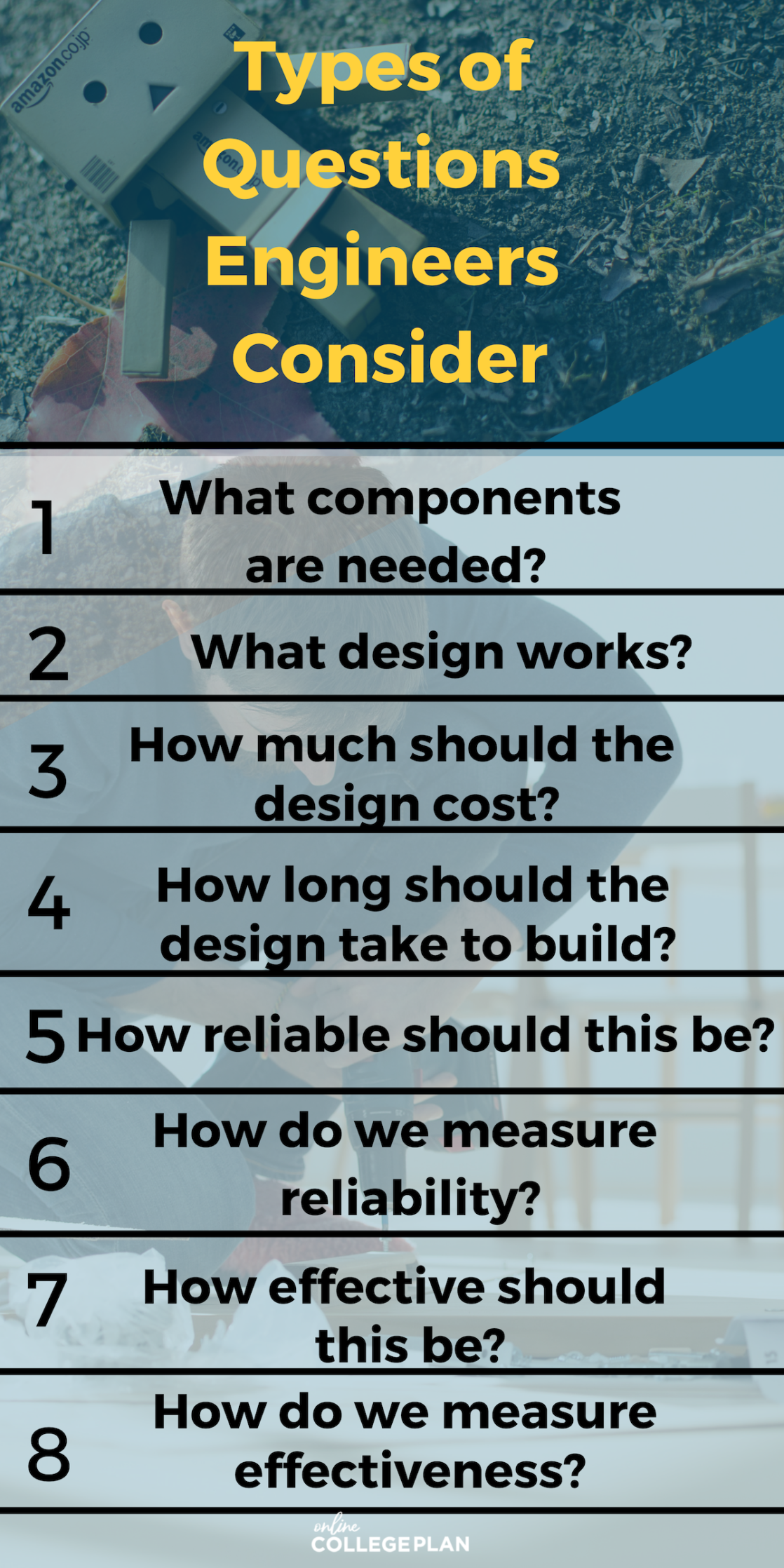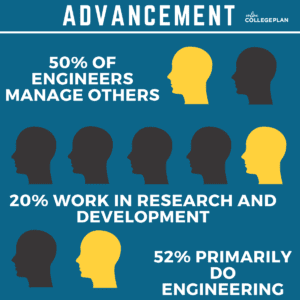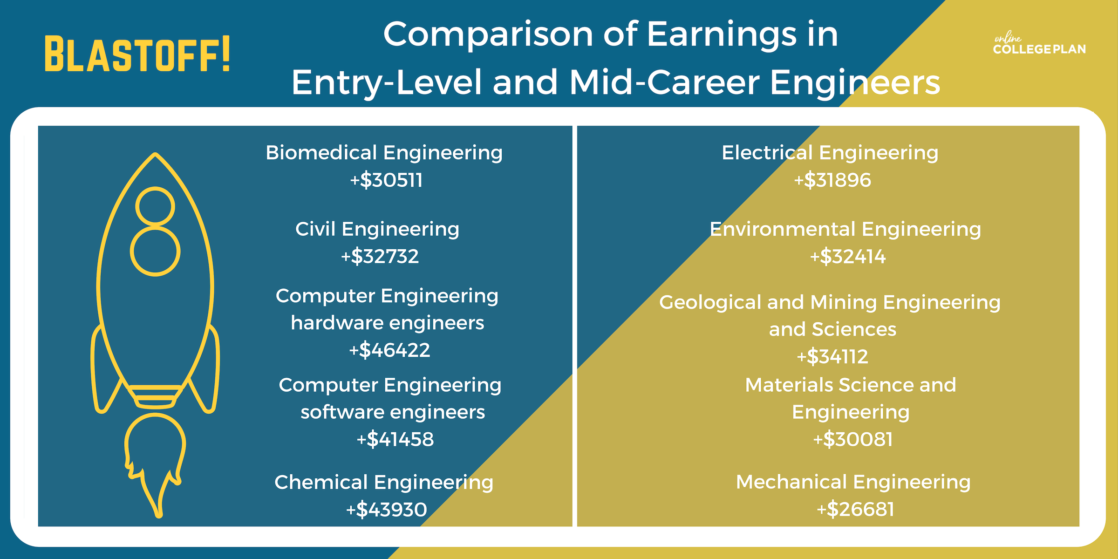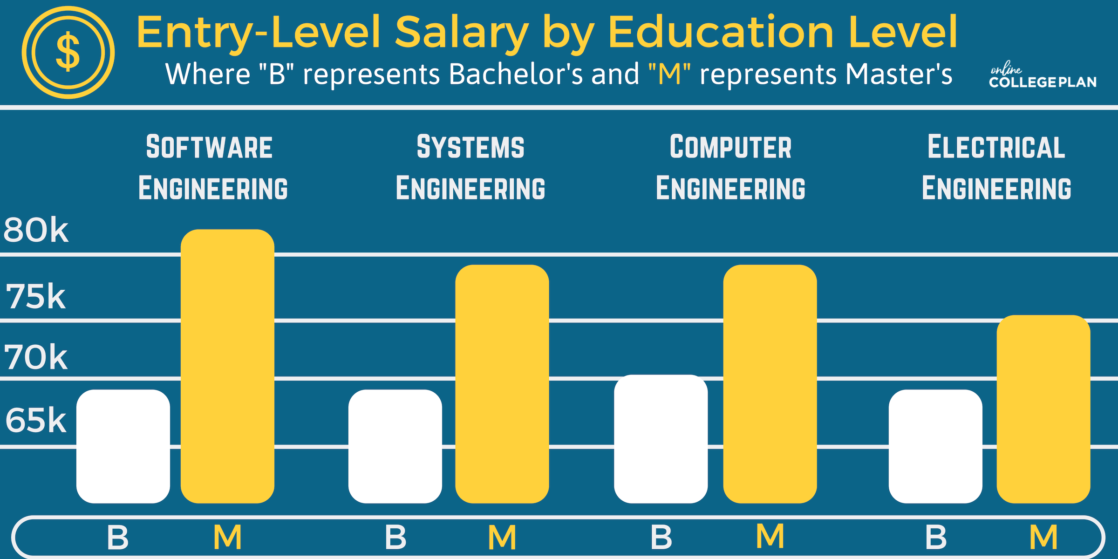Online Engineering Degrees

Degrees in Engineering

Do you love solving problems and abstracting the critical parts of a situation into a systemic solution? Do you have strong spatial and logical intelligence? Do you want a career that’s in high demand, with the ability to move up in your organization, and that is lucrative?
Well, engineering may be a great field for you.

So what is engineering? We all know some of what engineers do. But at a high-level, engineering is the study of applying mathematical, scientific, and evidence-based practices to solve problems, make products, and enhance quality.
Engineers work at a systemic level, solving structural problems. And we don’t just mean physical structures. Rather, engineers “engineer” solutions to a wide variety of objects. The process of engineering can apply to organizational change, to intangible objects such as algorithms, to theoretical investigations, as well as to very physical objects like houses, automobiles, and consumer goods.
From the screen on your phone to the seat on your bike, engineers play a critical role in the manufacturing of many of the things in your life.

Engineering jobs are important. They’re also a great opportunity for the right sort of student. For this reason, OnlineCollegePlan has compiled a guide to all of our content related to online engineering degrees. If you’d like to go ahead and take a look at our ranking of the best online engineering degree programs.
Looking for computer science and information technology-specific content? Check out our hub for these degree types here.
Engineering Degree Frequently Asked Questions (FAQ’s)
What Do Engineers Do?
Engineers apply scientific and mathematical techniques to come up with efficient solutions to technical problems. Engineers might attempt to answer questions like those in the following graphic.

Many engineers help to create new products or to improve existing products continually. In many corporate and governmental structures, this leads to engineers working at the project level. Engineers that excel in leadership qualities and organization often then get promoted to lead projects (project managers). Above groups of projects, program-level management takes an even higher view. In many organizations, once-engineers with management experience start to work on the program level.
This is to say that while most engineers start their careers dealing with technical matters, many move up into project and program management ranks.
While engineers often solve problems using many of the same processes, “what engineers do” often greatly depends on what type of engineer you are.

The Bureau of Labor Statistics divides engineering jobs into eighteen different subdisciplines that we will dive into in more detail in the Types of Engineering Degrees section below.
A quick look at the most common types of engineers follows:
- Aerospace Engineers
- Agricultural Engineers
- Bioengineers and Biomedical Engineers
- Chemical Engineers
- Civil Engineers
- Computer Hardware Engineers
- Electrical Engineers
- Electronics Engineers
- Environmental Engineers
- Health and Safety Engineers
- Industrial Engineers
- Marine Engineers
- Materials Engineers
- Mechanical Engineers
- Mining and Geological Engineers
- Nuclear Engineers
- Petroleum Engineers
- Other Engineers
While some of the above categories may be indistinguishable without further examination (say, electrical and electronics engineers), a solid idea of “what engineers do” can be answered by what type of engineer you’re talking about.

Nuclear engineers work on engineering problems related to nuclear power plants (among other things). Petroleum engineers work on engineering problems related to the drilling, transport, and storage of oil and natural gas (among other things). Civil engineers work on public projects including bridges, roads, and railways (also, among other things).
Chances are if it’s an object of any size or complexity, an engineer had something to do with some part of its creation. From the Empire State Building to your toothbrush, engineers played a role!
What Are The Career Prospects of Engineers Like?

Career prospects for engineers often start before students have graduated from their undergraduate course of study.
Engineering students are nearly always in demand. And many students at well-known universities obtain both engineering internships as well as job offers before (though contingent on) graduation.

Among top-tier universities, often 50% or more of undergraduate engineering students obtain an internship during their course of study. Though there isn’t a national survey of the percentage of students obtaining job offers in engineering upon graduation, anecdotal evidence points to 55-60% getting job offers from top-tier schools.
Among entry-level jobs in engineering, initial pay rates vary based on the type of engineering.
Entry-level salaries for some of the most common engineer types are listed below:
Average Entry-Level Salaries for Engineers By Specialty
- Biomedical Engineering: $62459
- Civil Engineering: $59058
- Computer Engineering – Hardware Engineers: $73,228
- Computer Engineering – Software Engineers:$70,322
- Chemical Engineering: $68500
- Electrical Engineering: $67684
- Environmental Engineering: $58766
- Geological and Mining Engineering and Sciences: $69598
- Materials Science and Engineering: $68529
- Mechanical Engineering: $64819

Source: Payscale.com
Within 2-3 years, many newly-employed engineers are starting to fall into pay grades and responsibility levels characterized as “mid-career.” While engineers straight out of school are in high demand, a great deal of learning beyond the initial theory taught in educational settings is completed on the job.

Once a recent graduate has accrued several years of on-the-job learning, they are generally much more valuable, will have an easier ability switching locations or employers, and are starting to become viable for lower level management positions.
An alternative route towards mid-career pay grades and responsibility levels may be achieved through obtaining a master’s or Ph.D. in an engineering field before joining the workforce. Generally, advanced engineering students have already held down an engineering job for some time, however. And many — particularly online — graduate engineering degree programs are offered for full-time working and non-traditional students.

For those seeking to advance their engineering knowledge at graduate levels, they should take heart that online engineering degrees are among the most flexible and adult-learner friendly out there!
Average Mid-Career Salaries for Engineers By Specialty
- Biomedical Engineering: $92970
- Civil Engineering: $91790
- Computer Engineering – Hardware Engineers: $119,650
- Computer Engineering – Software Engineers: $111,780
- Chemical Engineering: $112430
- Electrical Engineering: $99580
- Environmental Engineering: $91180
- Geological and Mining Engineering and Sciences: $103710
- Materials Science and Engineering: $98610
- Mechanical Engineering: $91500
As engineering careers progress, opportunities and potential career paths become more varied. In many engineering-heavy organizations, a large portion of the organization’s management is comprised of engineers.
Engineers that can explain technical concepts to a variety of stakeholders, and who have good leadership qualities are often “shoe-ins” for at lower-level management at least. Perhaps the most common management position in many engineering organizations is the project manager role.

Project managers are responsible for the planning stage, the procurement stage, and execution stages of a given project. Many project managers are in charge of teams ranging for 2-10 team members. The mean team size among many project managers presented in a survey was slightly over 4 team members.
The best project managers are able to effectively deal with a variety of stakeholders including technical team members, non-technical team members, management, clients, and other branches of the organization. The ability to understand highly technical engineering concepts and explain them in terms non-technical stakeholders can understand is a highly-valued skill in engineering leadership.
If you excel (or think you’d excel) in engineering coursework, are a “people person,” and can explain technical concepts to non-technical people, you may be a great fit for project management!
Additional roles common in engineering organizations include project expert, lead engineer, product manager, program manager, and higher management roles.
Economy-Wide Demand for Engineers
While we’ve looked at salary ranges, the ability to advance, and demand right out of school for engineering students, it also helps to look at economy-wide demand for engineers.
Presently, engineers have an unemployment rate of less than 2%. That’s compared to the average unemployment of almost double that (3.7%). Even at the height of the great recession, engineers only had an unemployment rate of 6.4%. That was compared to a nationwide unemployment rate of over 10%!

While there are many locations chock full of high-paying engineering jobs, a handful of locations stand out. Many of the “best” locations for engineers offer high compensation, many employers, and cutting-edge projects to work on. Many of these locations are centers for governmental research, transportation hubs, or centers of innovation.
Some of the most touted locations in the nation for engineering pay, range of opportunities, and range of employment include the following:
- Huntsville, Al
- Warner Robbins, GA
- The “Space Coast,” Florida
- The Suburbs of Detroit, MI
- Silicon Valley, CA
- Houston Metro, TX
- Midland, TX
- Decatur, AL
- The Tri-Cities, WA
- Dayton, OH
Among states with the highest salary for engineers, the following stand out:
- Alaska
- California
- Washington, D.C.
- Louisiana
- New Jersey
- Connecticut
- New York
- Texas
- Washington
- Tennessee
Types of Engineering Degrees (Specializations)

As you can see above, there’s a huge range of engineering types. Almost all engineering types have corresponding degrees you can take. With that said, they all require on-the-job training. And many engineers find themselves employed in an engineering field different from the one they studied for at some point in their career.
Some of the most common types of engineers (as well as degree specializations) include chemical engineering, civil engineering, electrical engineering, and mechanical engineering.
At the bachelor’s level, a core group of general engineering courses is complemented by a group of specialization courses. These courses are often what distinguishes a B.S. in chemical engineering from a B.S. in Electrical Engineering. While nearly any engineering specialty can prepare you with the basic framework and background knowledge to solve engineering problems, a specialization can give you industry-specific knowledge much valued by employers.
Chemical Engineering

Chemical engineers are well-rounded scientists that apply knowledge of chemistry, biology, physics, economics, and statistics to solve real-world engineering problems. The problem set chemical engineers are most concerned with includes the creation, transportation, holding, and disposal of chemicals.
The world would look very different without plastic or concrete. Baby diapers, they were made by chemical engineers too!
Today there are over 35,000 chemical engineers that work in lab settings, manufacturing settings, and construction sites (among others).
Chemical engineers are well compensated, with the average Chemical Engineer making over $100,000 a year.
Typical entry-level education for chemical engineering jobs is a bachelor’s in chemical engineering. And knowledge is crucial for this critical job. That’s why OnlineCollegePlan has compiled a ranking of the best online colleges for chemical engineering.
Civil Engineering
Ever play with Lego’s as a kid? Well, you’ve explored some of the most basic principles of civil engineering.

Civil engineering uses mathematical expertise to ensure the structural integrity of building and infrastructure projects. Civil engineers design bridges, airports, houses, railways, and more. Chances are, you’re within sight of a civil engineering project right at this moment.
With so many civil engineering projects, it’s no wonder that it’s perhaps the most common engineering specialization. According to the Bureau of Labor Statistics, there are over 300,000 currently employed civil engineers in America. That’s a civil engineer for every 1,000 people in the nation!
Just because there are many civil engineers doesn’t mean that it’s not a well-compensated career. The average salary for civil engineers is currently about $85,000 per year.
Civil engineering is important, and not a job you want to leave to someone without the proper schooling. For this reason, OnlineCollegePlan has compiled a ranking of the best online civil engineering degree programs.
Electrical Engineering
Chances are, you’re reading this on a device that couldn’t have been made without electrical engineers. Electrical engineers design, develop, test, and help to supervise the creation of electrical equipment. Closely related electronic engineers specialize in one type of electrical equipment. Together these engineering types are responsible for the creation, maintenance, and improvement of all sorts of goods.

Radar, communications equipment, electric motors, consumer electronics, GPS systems, and power generation equipment are all created by electrical engineers. As you can probably guess, this leads to high demand for good engineers of this type.
According to the Bureau of Labor Statistics, over 324,000 engineers currently specialize in electrical or electronic engineering (in America). That makes electrical engineering possibly the most common type of engineering. That doesn’t mean it’s not well compensated. Electrical engineers generally require just a bachelor’s degree to get started and bring in an average salary of $97,970.
Because this type of engineering is so important (and such a good opportunity for students), OnlineCollegePlan has compiled a ranking of the best online engineering schools. While our ranking focuses on general engineering degree programs, many offer specializations in electrical engineering.
Mechanical Engineering
Many of the world’s consumer goods couldn’t get made without mechanical engineers. Mechanical engineers are more often than not employed in manufacturing and heavy industry settings. They focus on the design, maintenance, and improvement of mechanical and thermal sensors and devices.

Ever wanted to design a manufacturing facility? Well, mechanical engineers do this, every day. There are also many opportunities in the field with over 288,000 mechanical engineers currently employed in America. Even with so may fellow engineers, mechanical engineers aren’t undervalued either. The average salary for mechanical engineering positions is currently $85,880.
Perhaps best of all, mechanical engineers typically just need a bachelor’s in engineering degree to land their first job. If you think you might be interested in studying mechanical engineering, check out our ranking of the best online engineering programs today.
Degree Levels of Engineering Degrees

Bachelor’s Degrees in Engineering
For a vast majority of working engineers, a bachelors-level engineering degree is what gets them into the field. Touted by many as one of the most challenging undergraduate degrees, for many working engineers, it makes a great foundation from which to tackle real problems in the engineering workplace.
Although each particular bachelors-level engineering program will be slightly different, many core components are similar. Practicing engineers in most fields are required to pass exams provided by the National Council of Examiners for Engineering and Surveying (NCEES). These exams include the following:
NCEES Exams
- Fundamentals of Engineering (FE)
- Principles and Practice of Engineering (PE)
- Structural Engineering (SE)
Most recent graduates will be required to study for and complete the Fundamentals of Engineering exam soon after employment has begun. The follow-up exam called the Principles and Practice of Engineering requires at least 4 years of post-college work experience. And the Structural Engineering exam is required in states that require engineers working on structural projects to be licensed separately.
Generally, each state has slightly different requirements for what exams are required. Most bachelors-level engineering programs provide a broad base of knowledge aimed at preparing graduates for NCEES exams nationwide.
Bachelor’s Specializations

One commonality between engineering curricula is a strong basis in mathematics and sciences. Almost all engineering disciplines will require several semesters of physics, calculus, trigonometry, and at least one course in statistics.
Chemical and nuclear engineering degrees require varying degrees of chemistry courses. Beyond this common core course load, courses are dependent on the type of engineering program you’re in.
Engineering degree types at the undergraduate level can vary by college and university. Types of undergraduate degree in engineering in the US, the UK, and Canada include the following:
- Bachelor of Science Engineering (B.Sc.Eng.)
- Bachelor of Engineering (B.Eng.)
- Bachelor of Engineering Science (B.Eng.Sc.)
- Bachelor of Science in Engineering (B.S.E.)
- Bachelor of Applied Science (B.A.Sc.)
For each of those degree types, students may also choose to focus on a type of engineering. Types of engineering programs most commonly found at the undergraduate include the following:
- Biological/Chemical Engineering
- Chemical Engineering
- Clean Technology
- Computer Engineering
- Civil Engineering
- Electrical and Computer Engineering
- Electrical Controls Engineering
- Engineering Management
- Environmental Engineering
- Fire Protection Engineering
- Geological Engineering
- Geomatics Engineering
- Geotechnical Engineering
- Information Science and Engineering
- Industrial Engineering
- Instrumentation Engineering
- Integrated Engineering
- Manufacturing Engineering
- Materials Engineering
- Marine Engineering
- Mechanical Engineering
- Mechatronics Engineering
- Mining Engineering
- Nuclear Engineering
- Plastics Engineering
- Production Engineering
- Textile Engineering
- Robotics and Automation Engineering
- Structural Engineering
- Software Engineering
- Systems Science
Engineering encompasses projects in many, many fields! At the undergraduate level — particularly if you scout around for a college with the program you’re interested in — you can already begin to specialize.
While undergraduate degrees in engineering can provide the groundwork for a long and fruitful engineering career, it’s worth noting that a great deal of job-centered knowledge is gained once you’re employed. For that reason, even if your major is just a general engineering degree, you’re good to go in many fields of work. And you’ll continue to learn as an engineer.
Online Bachelor’s Degrees in Engineering

In recent years, many engineering departments have begun offering online degrees in engineering. While this may seem impossible to old-school engineers who spent countless hours in physical lab spaces, online education generally has refined a wide range of support services that actually lend themselves quite well to engineering degrees.
Perks of many online engineering degree programs include:
- Accelerated or self-paced courses.
- No set class times (for some universities).
- 24/7 tutoring services (for some universities).
- Ability to work from home.
- Access to online libraries.
- Access to online labs.
- Agreements with local colleges you can take courses from (for some universities).
- Lower costs (often).
- Geared towards working students (often).
- Regionally accredited (often).
OnlineCollegePlan prides itself with keeping up-to-date with the latest in online engineering degrees. If you think you might be interested in an online bachelor’s in engineering degree, check out our ranking of the best online bachelor’s in engineering degree programs today!
Master’s Degrees in Engineering

Traditionally the masters level is when students truly specialize in one area of engineering. Master’s level engineering degrees often require around 45 semester credit hours. Depending on the flexibility of the program you’re attending, this translates to 1.5-3 years of full-time study (quite a difference!).
Masters-level engineering degrees are often geared towards those who are already working full time as an engineer (or in a related role). And were one of the first-degree types to be offered widely in an online format.
Online Master’s Degrees in Engineering
As one might expect, engineering was one of the first degree types to utilize technology to deliver coursework. At the graduate levels, online education has long been offered to help provide flexibility for working professionals trying to obtain an engineering degree.
Because online delivery for master’s in engineering degrees is so widespread (and been around for some time), employers are used to online degrees in the field. This is good news for students looking to obtain their degree while working full time or balancing other life obligations.

Online master’s in engineering degrees are primarily offered as a specialization in one type of engineering. For example, it’s uncommon to find a master’s of science in Engineering generally. Rather, one may find a master’s of science in aerospace engineering, or chemical engineering, or mechanical engineering.
OnlineCollegePlan has created a number of rankings of the best online master’s in engineering degrees. If you’re interested in pursuing a civil engineering degree, check out our ranking of the best online master’s in civil engineering degrees.
Doctoral Degrees in Engineering
Finally, doctoral degrees in engineering are the pinnacle of engineering education. In a doctoral degree, students become highly specialized in one area of engineering, often pursuing formidable and unique research that is publishable.
While a doctoral degree in engineering is a great way to truly stand out in engineering settings, it also opens the door to working in research settings or as a university instructor.
We have ranked the Top Online PhD Programs in Engineering Management

Generally speaking, there are two forms of doctoral degrees in engineering. Doctor of Engineering degrees contain more applied knowledge and are a professional degree for those likelier to leave the university setting upon completion of the degree. Ph.D.’s in engineering are research degrees in which students must complete unique and substantial research furthering their field of study before graduation. Ph.D.’s generally take somewhat longer and prepare graduates for teaching at the university level.
For a more comprehensive look at doctoral engineering program types, check out the engineering section of our doctoral hub page.
